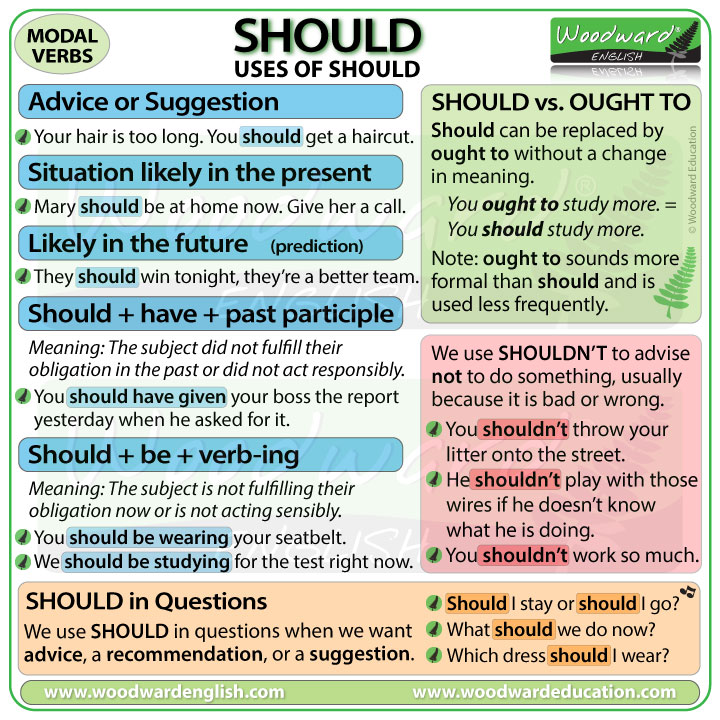SHOULD
Should is a modal verb.
With modals verbs, there is only one form of it for every subject pronoun:
- I should
- You should
- He should
- She should
- It should
- We should
- They should
There is never an S at the end of should:
- He shoulds study. (NOT CORRECT)
- He should study. (CORRECT)
After Should we have the base form of the infinitive (= verb without ‘To’ e.g. Go instead of To Go)
Should + Verb (base form of infinitive)
- You should go now. (Correct)
- You should to go now. (NOT correct)
- He should wait. (Correct)
- He should waits. (NOT correct)
Example sentences with Should:
- I should eat more vegetables.
- You should take an umbrella.
- He should go to the doctor.
- She should apply for the job.
- It should be fine.
- We should study more.
- They should wait until tomorrow.
One other thing, we do not pronounce the L in the word should. (Listen to the pronunciation of should in our video)
When do we use SHOULD in English?
1. To give advice, a recommendation or a suggestion
This is to say that it is the right thing to do or the correct thing.
- You should see the new Star Wars movie. It’s great!
- He should go to the dentist if his tooth still hurts.
- The test is next week. We should study for it now.
- You should try that new restaurant on Main Street.
2. To express that a situation is likely in the present or in the future. This is a type of expectation or prediction.
- Mary should be at home now. Give her a call.
- He should have the letter now. I sent it last week.
- Our team should win the game on Saturday. (Because we have been training all month so it is our expectation, or prediction that we will win.)
- It should be sunny tomorrow.
3. Expresses an obligation that is not as strong as Must.
Sometimes Should is used instead of Must to make rules, orders or instructions sound more polite.
This may appear more frequently on formal notices or on information sheets.
- Applications should be sent before the 30th.
- He should drive more carefully.
- Everyone should wear a seatbelt in a car.
- You should pay more attention in class.
All of the above example sentences can have must instead of should making the obligation stronger and less polite.
For example: Applications must be sent before the 30th.
4. Something was expected in the past but it didn’t happen (should + have + past participle)
This expresses the idea that the subject did not fulfill their obligation in the past or did not act responsibly.
- Anna is late. She should have arrived by now.
- I should have called Fred this morning but I forgot.
- You should have given your boss the report yesterday when he asked for it.
5. Not fulfilling an obligation (should + be + verb-ing)
This expresses the idea that someone is not fulfilling their obligation or is not acting sensibly right now.
- You should be wearing your seatbelt. (The person isn’t wearing one right now)
- We should be studying for the exam. (We are not studying right now and we should be studying)
6. Sometimes should is replaced by ought to without a change in meaning. Note that ought to sounds more formal and is used less frequently.
- You ought to go home now. (= You should go home now)
- She ought to take her dog for more walks. (= She should take her dog…)
- They ought to stop doing that. (= They should stop doing that)
Shouldn’t
The negative of should is shouldn’t or should not.
We almost always use the contraction shouldn’t in spoken English.
We use shouldn’t to advise not to do something, usually because it is bad or the wrong thing to do.
- You shouldn’t eat that dessert if you are sick.
This is my recommendation not to do something, not to eat that dessert.
- She shouldn’t buy that dress, it’s too big for her.
- You look tired. You shouldn’t work so much.
- He shouldn’t talk to his boss like that.
Notice how all of these sentences are about a recommendation or advice NOT to do something.
Think + should
We do not use: I think + shouldn’t.
We use: I DON’T think + should.
- I think you shouldn’t go there. (NOT correct)
This is NOT correct because we don’t have the negative shouldn’t after I think.
Instead we make the verb THINK negative and say:
- I don’t think you should go there. (Correct)
A couple more examples:
- I don’t think he should eat that.
- I don’t think we should start yet.
Should in Questions
We use should in questions when we want advice, a recommendation, or a suggestion.
Let’s look at this affirmative sentence:
- I should go now.
How can we change this to a question?
We change the order of the modal verb should with the subject.
So the question becomes:
- Should I go now?
A couple more examples…
- Should I wear the green shirt? (I am asking for your advice or recommendation)
We can also have the W words like What, When, Why, etc. before the modal verb.
- What should we do now? (What do you suggest?)
SHOULD English Summary Chart

